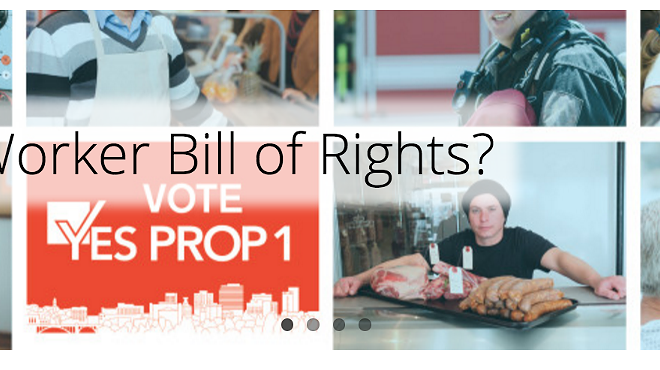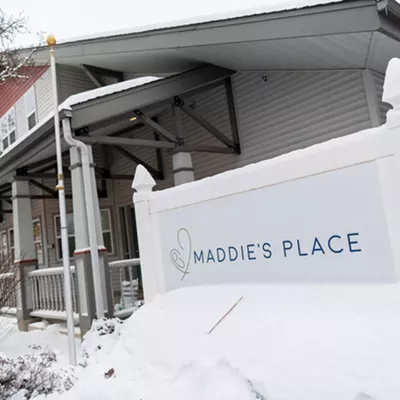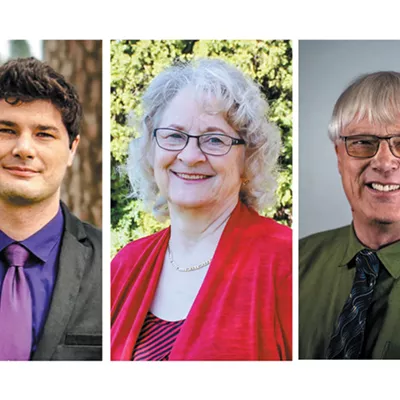Larry had a question about Proposition 4. A burly man in a midnight-blue knit shirt, Larry hitched up his pant leg and leaned forward in his chair at the Browne Elementary School gymnasium in northwest Spokane last week, aiming his whole body at the two shaggy young men onstage.
The two men, Kai Huschke and Chad Nicholson, are staffers for Envision Spokane — a broad-based group that has spent nearly two years crafting a bill of rights that promises to empower the powerless in Spokane. It’s on the November ballot as Proposition 4.
The Community Bill of Rights is seen as so earth-shaking that even an opposition group, Save Our Spokane, prints it in its entirety with no distortion or commentary and hands it out on the assumption that people will read it and be horrified.
People like Larry.
“As I read this,” Larry began, holding aloft a sheet of paper containing all nine amendments of the Community Bill of Rights, “neither side can predict what the cost is going to be. The language is so vague that only the court can decide what it means.
Related Story
Bill of Rights Basics
Your guide to the nine amendments in Envision Spokane's Bill of Rights
“Take No. 5, ‘The natural environment has the right to exist and flourish.’ This tells me you can’t do anything in the natural environment: You can’t drive a car, you can’t smoke a cigarette, you can’t mow your lawn, you can’t fertilize your lawn, you’ve got to take the dams down so the fish can swim …”
“Larry!” came a sharp remark from the evening’s moderator, “Is there a question in there?”
Larry, just getting up a head of steam, bites his tongue and sums up: “You can’t tell me what this means.”
This is the sort of “question” that Envision Spokane and Prop. 4 supporters have been getting this summer and fall.
Opposition is widespread. Downtown business groups are in a lather, saying it could wreck efforts to attract jobs to the city. The development and real estate industries are donating heavily to defeat it, worried that property development will be vetoed or complicated by neighborhood residents who suddenly have a voice in the process.
The mayor is against it, saying the city can’t begin to meet the cost of implementation.
Not a single member of the City Council can abide it. At one meeting in July, Councilman Al French tried to keep it off the ballot entirely even though Envision had gathered more than 5,000 signatures when they needed fewer than 2,800 to put it to a vote. At another meeting, after the county elections office qualified the Bill of Rights for the ballot, French introduced two “advisory questions” — one asking what taxes should be raised to pay for the Bill of Rights and the other asking what city services should be cut even though no costs are known. (And the advisory questions were maneuvered ahead of the Bill of Rights on the ballot, appearing as Propositions 2 and 3.)
Finally, every candidate running for City Council this fall is united in opposition to Prop. 4 — even the ones who can’t agree with their opponents on any other matter.
How can so many rights be so wrong?
Is It All Unicorns and Rainbows?
An e-mail sent out recently by Rich Hadley, president and CEO of Greater Spokane Incorporated, the chamber of commerce, warns that “a small group of activists, rooted in the East Coast,” is behind Prop. 4. This “small group of unelected activists,” the e-mail continues in bold type, are going to bankrupt the city.
Hadley’s e-mail contains the sort of hyperbole that has become common in the last month.
Many critics say that making the cost of doing business in Spokane more onerous and expensive may cause business to flee and certainly won’t help recruiting. Even without Prop. 4, Cabela’s and Buck Knives in recent years located just across the state line in less-expensive Idaho.
Nearly two years in the making, the Bill of Rights came from home-grown frustrations by home-grown Spokane residents like school teacher Brad Read, who watched as local neighborhood groups lost fight after fight with big-box stores headquartered somewhere else.
Neighborhood rights activists hooked up with labor activists who hooked up with environmental activists who began to work on the Bill of Rights. They sent out thousands of invitations, made presentations even to potentially hostile groups such as the Spokane Home Builders Association, shopped it around at neighborhood councils and then took it on a city-wide round of town hall meetings to see what people thought, whittling it from 11 rights to a revised nine along the way.
It’s hardly a cabal.
Envision Spokane did engage a public-interest attorney from Pennsylvania, Thomas Linzey, who has helped numerous small towns — and the nation of Ecuador — create tools to fight corporate abuses. Linzey is buying a house in West Central and has joined the neighborhood council.
Time for Some Role-Play
Teacher Brad Read is a large man, with big hands and Paul Bunyan shoulders. In recent weeks, the Spokane Home Builders Association has requested his e-mails from the school district. Rumors flew that an out-of-town writer had been hired to do hit pieces on Envision Spokane board members. If these and other attacks are taking a toll, Read doesn’t show it.
He moves like an iceberg through the milling people assembled last week for a strategy session in a board member’s living room.
During the round of introductions, he even jokes, “And here is Tom Linzey, carpetbagger.”
The board, after a short-lived effort to toss out The Inlander, outlined common attacks from the opposition — on health care, local economy and neighborhood rights — and drilled each other on effective responses. The role-playing went around the circle of couches and folding chairs for more than an hour, with some members stammering when confronted with blunt questions.
Control of the message is crucial, they were told.
“Our feeling is [that] there is a vast number of people who have not heard of Prop. 4,” Linzey tells the group. “But of the people who know about it, we’re running 50-50, which I think is extraordinary. We have a shot at winning.”
With hardly any money for big media buys, Envision is pounding the streets and ringing doorbells, talking to people one at a time.
The opposition “is going to cream us with media stuff. They are going to stomp the crap out of us in the last two weeks before the ballots drop,” Linzey says. “This is only winnable if we get out there and reach the unknowns.”
The Way To Fight Bambi
“I’m going to start by reading the initiative. A lot of people see the ballot title and it’s sooooo wonderful,” says Michael Cathcart. After reading the summary, Cathcart smiled at the dozen people in the East Central Community Center one evening last week and asked, “Now doesn’t that sound like a wonderful mission statement for the city of Spokane?”
Hold the group hug, though. Cathcart, involved for several years in Ron Paul’s Campaign for Liberty, is now heading the Save Our Spokane Political Action Committee, formed expressly to defeat Prop. 4. The Spokane Home Builders Association has even loaned out Edie Streicher, its director of government affairs.
SOS has been busy, scheduling town halls in each of the city’s three council districts and with neighborhood councils as well.
A sense of unease is driving the opposition. There is no Voters’ Pamphlet this election, so the only official word voters will see is the summary paragraph which makes Prop. 4 seem like an apple pie in the oven.
“We did some polling in June and, of the people who just read that part, 53 percent said they’d vote for it,” Cathcart says.
Councilman (and candidate) Mike Allen, who represents East Central, was also on hand, telling the small and mostly elderly group that Prop. 4 is going to create a chaos of lawsuits on almost every amendment for a city already facing a $7 million shortfall in the 2010 budget.
“Kate McCaslin [a former county commissioner] calls this the Lawyer Full Employment Program,” Allen says.
The same night, Spokane Mayor Mary Verner had been running her own town hall on the looming budget cuts in a different meeting room and quietly sat in on part of SOS’s. “The two are not unrelated,” she says.
Streicher highlighted the amendment that provides rights to the environment. An earlier version included protection for soils, since removed, and not just the aquifer and river, she says. The phrase “Ecosystems, including but not limited to,” she warned the group, could be hiding something.
“This is not about the river. This is about soil and rocks.” If the soil is protected from disturbance, does that mean no houses can be built, she asks?
Such terrible outcomes will cause business and development to beat feet into other parts of the county, or to Idaho, she warned. “The city of Spokane will cease to exist!” Streicher said.
The next day we called Streicher to ask if this wasn’t a bit over the top. “Cease to exist as we know it,” she modified.
Still, who could be so awful as to come up with such a document and think it was a good idea?
Putting His Money Where His Values Are
Jim Sheehan, taking a pull from a mug of coffee on a recent morning, contemplates why so many people are hurling lightning bolts at the short list of rights he sees as essential to a just and civil society.
“What this is is change. It’s dramatic, substantive, fundamental change — what we are doing is codifying all the things we say we believe in,” Sheehan says, sitting in his brick-walled office in Spokane’s greenest rehab building. There’s a large poster of Dr. Martin Luther King Jr. on the wall.
Prop. 4 is the latest initiative for Sheehan to put his money where his values are.
A surprise inheritance in the late 1990s allowed Sheehan to step away from a 25-year career as an underpaid, overstressed public defender. Instead of sailing around the world, Sheehan put the money to work on things he believes in. He created the Center for Justice in 1997 to take on civil rights issues. He rehabbed two buildings on the oft-ignored east end of downtown with one — the Saranac — becoming LEEDs Platinum-certified as a “green” building. Outside his window, he can see the transformation of a tire shop into a co-op market for regional, sustainable food.
He is supporting Prop. 4 to the tune of $55,000 because it hits themes he cares about — help for people who are struggling, a way to watchdog the environment, a means of redistributing power.
“I think it’s really important the entire community should benefit from my good fortune,” Sheehan says. “If you have social justice and economic justice and environmental justice, things work in a finely tuned way, and I think that’s what the [Community] Bill of Rights is trying to accomplish. It really walks the talk of the American Dream so that there are not just a few people who realize benefits from development but the entire community of Spokane.”
A right to affordable health care? Affordable housing? Neighborhoods with more than lip service in comprehensive land-use planning? Isn’t this a utopian vision of rainbows and unicorns?
“We hear all the time that it’s utopian,” Sheehan says. “I’m always wondering why that’s a detriment.”
He says he finds it interesting that even people against Prop. 4 often take pains to say they are not against the goals, but find it unrealistic.
“I think that a lot of the people working the other side — and where the funds are coming from — are people who profit from the status quo… and those are very few,” Sheehan says. “The Envision Spokane people are saying, ‘Let’s benefit all the citizens of Spokane.’”
The Call From City Hall
“I called Jim Sheehan because I admire him and I think he’s done wonders. I contacted him to let him know I would be an opponent of Proposition 4,” Mayor Verner says, sitting with her government affairs director Sheila Collins at a new maple conference table on the top floor of City Hall.
The view on a sunny afternoon takes in the river, parts of Riverfront Park and traffic rolling north from downtown.
There are holes in this canvas. Kendall Yards, the much ballyhooed office/retail development on the north riverbank, is still 78 acres of dirt two-and-a-half years after civic leaders gathered in a balloon-filled tent on the site to hail the future.
These days, the future of Spokane — at least as it relates to the general fund — is deflated. The budget shortfall is at least $7 million for next year, Verner says, and could be that much for each of the next two.
The language of the amendments in Prop. 4 is studded with terms such as the city “shall ensure” or “shall guarantee,” which, Verner says, means the city must find money and staff to implement them.
Right now, the city is seeking ways to avoid layoffs, she says, and if Prop. 4 passes, “Looking at having to spread additional work on employees already spread thin or somehow having to hire additional employees to take on these responsibilities… it becomes an impossibility.”
Some amendments, such as providing access to affordable health care, strike her as something the city might not have the authority to do in any event. Others, such as access to affordable housing, strike her as getting in the way of the ongoing coordination of city departments, nonprofits and the Legislature to provide a stock of affordable housing.
The mayor wants to be clear, she says, “about my support for the principles that are being advanced. These are fundamental values I support as a human being. It’s the Prop. 4 package that is problematic for government.”
Verner has attended at least two SOS town halls, speaking briefly at each when asked. “I was not asked to be on the panel. I stopped by to see what the citizens are saying.”
She refuses to characterize Envision as carpetbaggers and says she is no fan of fear-based arguments such as “millions” in lawsuits and “thousands” of jobs leaving the city.
Further, she adds, a loss for Prop. 4 is not a mandate for the status quo. “I feel a responsibility to address the underlying issues that our citizens have brought forward in Prop. 4. I maintain a commitment to be a bridge-builder,” Verner says.
Opponents Run “Greener” Campaign
As the rhetoric heats up surrounding Prop. 4, the money race has kept up a steady boil — and is about to blow the lid off.
“By the end of next week, we should have [raised] close to $100,000,” says Brian Murray, a political consultant for the Jobs and Opportunities Benefiting Spokane (JOBS) Political Action Committee, one of several groups raising money to defeat Prop. 4. “It’s tough to tell what that final number will be… We’d like to have $200,000 raised.”
The JOBS Coalition is the moneymaker in the race, having out-raised Envision by tens of thousands of dollars. The committee’s top 10 donors — which include the Cowles Company, Worthy Enterprises and Avista — have collectively contributed $44,000. It’s a coalition of developers, business people and realtors mixed with dozens of donors who gave less than $100.
The store of cash will be unloaded in mid-October, says Murray, when absentee ballots go out. Then we’ll all see the ad buy that JOBS is putting together for TV and radio, as well as some print ads in the Spokesman-Review and The Inlander.
Additionally, the group, which did some surveys in June, hopes to do more polling closer to Election Day if fund-raising goes according to plan, Murray says.
According to Public Disclosure Commission reports, JOBS has already spent nearly $13,500 on consulting from Stan Shore, who’s noted for aggressive and often negative campaigns.
In addition, the Community Builders Trust PAC, which is the political action committee for the Spokane Home Builders Association, is also raising funds to defeat Prop. 4. Spokane City Councilmen Al French, Bob Apple and Richard Rush all donated to this PAC. So did D-MAC Construction, the company owned by Councilwoman Nancy McLaughlin and her husband.
The largest donor from other either side of the campaign is still Sheehan, whose $55,000 to Envision represents about 85 percent of the group’s fund-raising total.
Send Lawyers, Guns and Money
The opponents of Proposition 4 warn of lawsuits — “thousands,” says former County Commissioner Kate McCaslin, who now heads a builders and contractors association.
“Most of the amendments are clear violations of the United States Constitution,” the Save Our Spokane talking points read. “These pieces will most certainly be challenged in court.”
Milt Rowland, a long-time litigator, agrees: “The only reason for the existence of any of those provisions is to give somebody the opportunity to sue.”
The whole shebang, he says, is problematic. Spokane just doesn’t have the legal right to enact the amendments to the City Charter.
In the seminal case of Chemical Bank vs. Washington Public Power Supply System in 1984, Rowland says, the U.S. Supreme Court ruled that a city only has the rights given to it by the state. And the state has not given Spokane the rights to do what it plans to do in Prop. 4, Rowland says.
Breaan Beggs, an attorney with the Center for Justice, says Rowland is interpreting the case far too broadly. Beggs and the center advised Envision Spokane on getting the Bill of Rights onto the ballot. The case Rowland cites applied to contracts, Beggs says, not to rights.
Prop. 4 faces other legal challenges. Among them: the single-subject provision. It’s a Washington requirement that ballot measures can tackle only one subject. You can’t, in other words, require voter approval for future tax increases and make car tabs $30 in the same initiative.
Prop. 4, however, talks about health care and business and housing and neighborhood councils and unions and energy and drinking water.
“This is not a single-subject initiative, this couldn’t be more clear,” Rowland says. Again, Beggs disagrees. As long as the provisions are shaped around a single theme — a healthy, sustainable and democratic Spokane, for instance — it’s OK under state law. A number of laws, such as the Crime Victim Bill of Rights, cover multiple topics.
Individual amendments in Prop. 4 could face their own legal challenges. Take Amendment 8, which requires employers to remain neutral during employee unionization. It’s a lot like a bill in California that prevented employers receiving large state grants from using that money to “assist, promote, or deter union organizing.”
That law was struck down by the U.S. Supreme Court in Chamber of Commerce v. Brown in 2008. It violated the National Labor Relations Act, the court found.
Envision Spokane campaign manager Kai Huschke admits the neutrality provision may conflict with one part of Brown. In fact, he’s counting on it: “It is a direct move to challenge that federal law.”
Beggs doesn’t agree with the fears of hundreds of lawsuits that opponents spread. He says Prop. 4 would be more like the U.S. Constitution, something that legislators look to — a guiding document — when writing more specific laws. Sure, some of the provisions may be broad. But so is the First Amendment. It’s up to the City Council, Huschke says, to write precise ordinances based on Prop. 4’s broad brushstrokes.
Two Sides of the Coin
Jim Frank and Ron Wells have each made a name in Spokane for “good,” forward-thinking development — Frank largely in the suburbs and Wells largely in the core. So what do they think of Prop. 4?
Perhaps true to their reputations, each says he has taken the time to research the Community Bill of Rights beyond talking points and scare tactics.
“While I think there are some objectives that are laudable, I think the approach they have taken is seriously flawed,” says Frank, who sees chaos and unintended consequences arising from Prop. 4.
“The first time I read it,” Wells says, “I liked about 90 percent of it but had some concerns.” He sought answers, Wells says, “and I am solidly supportive.”
When it comes to the right of neighborhoods to control development by enforcing the city’s comprehensive land-use plan, Frank sees potential anarchy where Wells sees order.
Land-use fights will blow up with ignorance, apathy and NIMBYism, Frank says. “The fundamental problem isn’t that the comp plan isn’t enforceable. The fundamental problem is people don’t want the comp plan to be implemented.”
He cites an example where a project that included some affordable housing created such uproar over rumors of poor people and pedophiles moving in that 500 people filled a gymnasium to shout it down — all based on fear and conjecture, Frank says.
“There was this hysteria, what I call this anarchy,” of a project getting shot down for reasons clearly illegal, he says.
This sort of ugly chaos, Frank predicts, will be the unintended consequence of Prop. 4. “It’s mouthwash. It says pretty words. This charter amendment pits people against each other and creates litigation. It’s fantastic for lawyers.”
Wells, on the other hand, says Prop. 4’s neighborhood provision clearly steers away from chaos.
“The right of neighborhoods to control development projects is limited only to zone changes,” Wells says.
Your neighbor can’t stop you from building a new garage if he doesn’t like it, Wells says of a claim being tossed out at anti-Prop. 4 gatherings. “This is misinformation and a total lack of understanding.”
Prop. 4 “trods on some sacred cows, and some of the gatekeepers for the status quo don’t like what this sets out to do,” Wells says. “We have a long-standing tradition of speculative development,” where properties are often rezoned to become more valuable.
“What this does is: It says the [comp] plan is sacrosanct… all the willy-nilly changing zones are out the window. This is very consistent with the state of Washington Growth Management Act,” he says.
One question, he adds, sums up the controversy: Does the city want to keep a system “where political influence and patronage buys up-zoning to the advantage of land speculators, or do we let the neighborhood and city come up with a plan and live with it?”
Opposition to Prop. 4 is strikingly similar in tone, Wells says, to the “radical concepts” of women or African-Americans getting the right to vote.
“Any revolutionary idea fresh out of the chute takes a while to be understood.” It’s striking, Wells says, that every elected official is against Prop. 4 — and that it may well fail in November. “I predict next time around, that will change.”
Send comments totheeditor@inlander.com. Nicholas Deshais, Joel Smith, Daniel Walters and Sam Stowers contributed to this report.

















